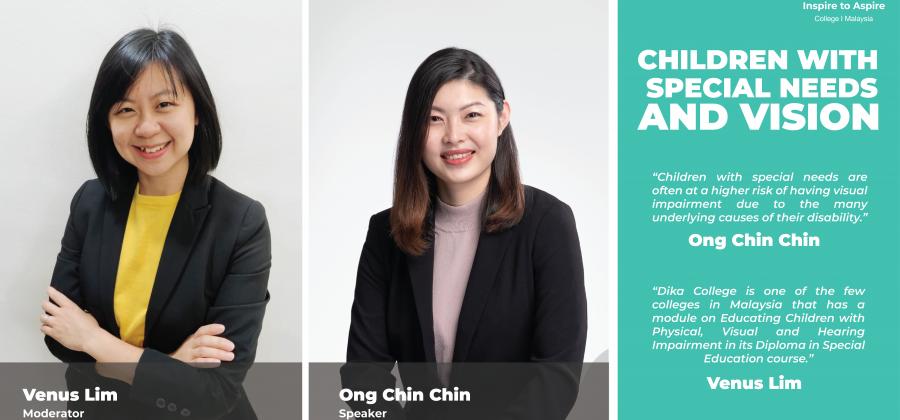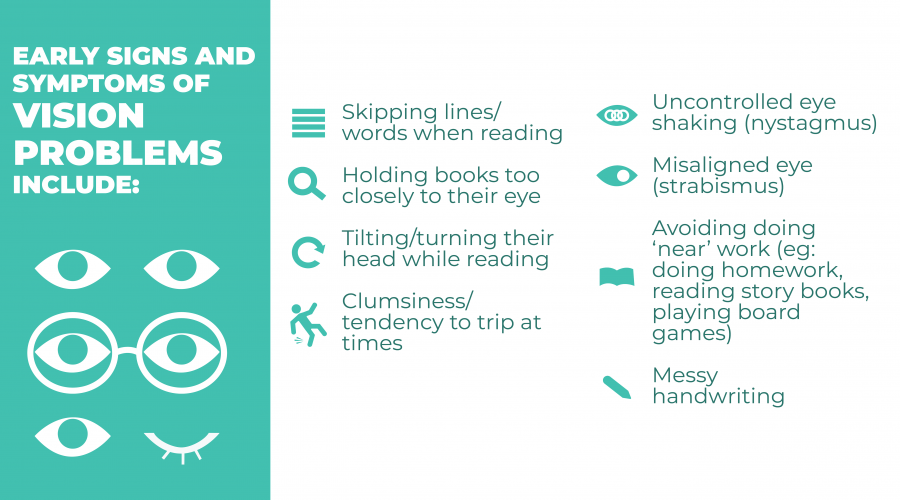19 Nov Webinar: Children with Special Needs and Vision

A webinar on Children with Special Needs and Vision was organised by Dika College in collaboration with the Sunway Eye Centre on the 6th of November 2021.
Aimed at creating awareness among parents, teachers and the public in general, this webinar was moderated by Venus Lim, Dika College’s Head of School (Special Education Needs). The speaker for the webinar was Ong Chin Chin, Manager of the Sunway Eye Centre.
Vision Impairment in Special Needs Children
“Every child deserves the same learning opportunities and chance of life achievements. Early detection is key in preventing vision problems from exacerbating the symptoms of a disability,” said Ong Chin Chin, Manager, Sunway Eye Centre.
According to Ong, about 25 percent of school-aged children have some sort of vision problem. Children with special needs are often at a higher risk of having visual impairment due to the many underlying causes of their disability.
Ong advised that early detection is key in preventing vision problems in a child. Some early signs and symptoms of vision problems include:

“Having more than one of the symptoms listed above could be indicative of vision problems. It would be advisable to bring the child for an eye assessment,” Ong said.
Vision Assessment
“Children with special needs have a short attention span and multiple visits to the doctor for an eye assessment may be required to minimise their anxiety and fear,” Ong explained.
“It would be good to be familiar with common jargons on the different types of vision impairment such as short-sightedness, far-sightedness, astigmatism, depth perception, squint eye, nystagmus (eye shaking) and lazy eye.”
“These eye problems could be prevalent for any of the different special needs including children with Down Syndrome, Autism, ADHD and Albinism, among others,” Ong continued.

ASSESSMENT: The Optokinetic Nystagmus (OKN) Drum is used to determine the presence or absence of vision.
The optokinetic reflex allows a person to follow objects in motion when the head remains stationary.
According to Ong, special tools and equipment may be used to carry out vision assessments on a child. These include the Optokinetic Nystagmus (OKN) Drum, the retinoscope, flashcards and grating cards, among others.
“Be prepared to have a more active role during the check-up. A parent or caregiver may be expected to help the doctor carry out tasks such as applying eye drops into the child’s eye for an eye test,” advised Ong.
In answering a question from a participant who asked what could be done about a child in her class who keeps losing his spectacles (which impacts his learning), Ong responded that this could be a simple behaviour issue where the child dislikes wearing spectacles.
She advised empowering the child in choosing the spectacle design or colour he prefers to motivate him to make it a habit to put on his spectacles regularly.
Preparing Future Educators
“Students at Dika College who will be future educators are taught to be empathetic and sensitive to a child’s needs,” said Venus Lim, Head of School (Special Needs Education) at Dika.
“They are taught to pick up the early signs and symptoms of children with vision problems and work together with parents to have the child seek the eye care he or she needs as early as possible.”
“Dika is one of the few colleges in Malaysia that has a module on Educating Children with Physical, Visual and Hearing Impairment in its Diploma in Special Education course,” added Lim.
The Right Care at the Right Time
The life of a child who receives the right eye care at the right time is very different from one who does not. Support for eye care is readily available at government and private hospitals. Early detection and care of a child’s eyes are important in giving that child a chance of life achievements.
Read more about Dika College’s Early Childhood Education and Special Education (Early Years) academic programmes here, or call us today at +603-80706223 or on our mobile/WhatsApp: +6016-2286223.



Sorry, the comment form is closed at this time.